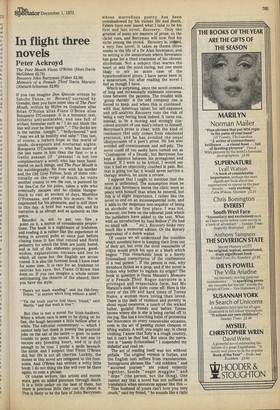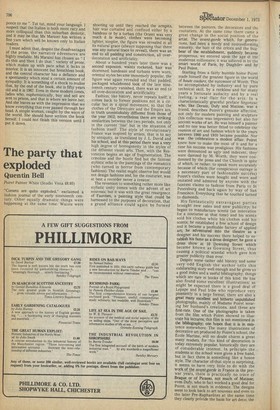In flight three novels
Peter Ackroyd
The Poor Mouth Flann O'Brien (Hart-Davis McGibbon £2.75) Recovery John Barryman (Faber £2.50) Memoirs of a. Female Thief Dacia Maraini (Abelard-Schuman £2.95) If you can imagine Don Quixote written by Sancho Panza, or Beowulf narrated by Grendel, then you have some idea of The Poor Mouth, written by Myles na Gopaleen alias Brian O'Nolan alias Flann O'Brien alias Bonaparte O'Coonassa. It is a hermetic text, hitherto untranslatable, and one full of archaic formulae such as "I do not think the like will ever be there again ", "The ducks are in the nettles tonight ", " bellycheered " and "may we all be healthy and safe! " This last, of course, a forlorn hope in the world of spuds, downpours and nocturnal nights. Bonaparte O'Coonassa — who has more of the last name in him than the first — is a Gaelic peasant (if ' peasant ' is not too complimentary a word) who has been handreared on such things, and The Poor Mouth is his autobiography. He lives with his mother and the Old Grey Fellow, both of them continually on the verge of death, he visits another county to see the sun, is pursued by the Sea-Cat for his pains, takes a wife who eventually escapes and he climbs HungerStack to visit an ancient of days, Maeldon O'Poenassa, and steals his money. He is imprisoned for his pleasures, and is still there to this day. A brief but varied life, and its narrative is as abrupt and as quixotic as this precis. Benedict is, not to put too fine a point on it, a moron of considerable proportions. The book is a nightmare of Irishness, and reading it is rather like the experience of being in several pubs at once just before closing time It has that rotund and florid pedantry for which the Irish are justly hated, and is full of the elaborate prayers, goodwishes, explanations, -excuses and lies to which all races but the English are accustomed. It is also the funniest book I have read for some time. It is rare for an Irishman to satirise his race, but Flann O'Brien has done so. If you can imagine a whole nation anticipating the theatre of the absurd, then you have the style: "There's not much standing," said the Old-GreyFellow, "in anyone who's long without a spud ".
" 'Tis the truth you've told there, friend," said Martin, "and that truth is true ".
But this is not a novel for Irish-bashers. When a whole race is seen to be dying on its feet, the laugh becomes a little hollow after a while. The editorial commentary — which I cannot help but think is merely the practical joke on the tail of the satire — goes to some trouble to point the moral. It is not one to escape any bleeding heart, and it is dull enough to be true. I prefer a smile beneath the smile, and I suspect that Flann O'Brien did, but life is not all cherries. Luckily, the stones in this novel are relegated to the footnotes. And O'Brien has written a witty little book: I do not thing the like will ever be there again, to coin a phrase.
Of course writers, like artists and moviestars, gain an added premium through death. It is a little unfair on the best of them, but there is precious little they can do about it. This is likely to be the fate of John Berryman,.
whose marvellous poetry has been overshadowed by his violent life and death. Fabers have now issued what I take to be his first and last novel, Recovery. Only the greatest of poets are masters of prose, so the cliche runs, and Berryman will now find his niche among the crowd. Recovery is, indeed, a very fine novel. It takes as theme three weeks in the life of a Dr Alan Severance, and its setting is the sanatorium where Severance has gone for a third treatment of his chronic alcoholism. Not a subject that warms the heart or sets the mind racing, but one more likely to stir an acute case of the hypochondriacal jitters. I have never been in a sanatorium, but after reading the novel I feel as though I have.
Which is surprising, since the novel consists, of long and occasionally elaborate conversations between the patients. The trouble with 'group therapy' is the odd company one is forced to keep, and when this is combined with that American talent for self-exposure and self-analysis Recovery runs the risk of being a very boring book indeed. It turns out, instead, to be a moving and strongly conceived account of one man's return to himself. Berryman's prose is clear, with the kind of resonance that only comes from emotional precision, and he has avoided the usual idiosyncrasies of a poet's prose. He has also avoided self-consciousness and self-pity. The novel could all too easily have turned out as 'Confessions of a Drunk', but Berryman has kept a distance between his protagonist and himself. If I were to be lyrical, I would say that it had an objectivity couched in pain. But that is going too far; it would never survive a therapy session, let alone a review.
I suppose that I ought to mention that the novel is unfinished. The assumption must be that Alan Severance leaves the clinic more at peace with himself than when he entered, but this is of slight importance. I rather like the novel to end on an inconsequential note, and it adds to the desperate non-sequitur of being an alcoholic in the first place. I was not, however, too keen on the editorial junk which the publishers have added to the text. What with an introduction by Saul Bellow (" He had no small talk ... " etc.), Recovery looks very much like a memorial edition. Or the literary equivalent of a dumb waiter.
Of course we all understand the troubles which novelists have in keeping their lives out of their art, but even the most reasonable of critics would prick his ears at a blurb which begins: "This remarkable book is a barely fictionalised transcription of the confessions of a real person ". If the person is real, why introduce fiction as a prop, and if the novel is fiction why bother to explain its origin? The book in question is Dacia Maraini's Memoirs of a Female Thief. Rogue narrative is a privileged and respectable form, but Ms Maraini's does not quite come off. Hers is the story of the life and hard times of Teresa Numa, a woman more loving than loved. There is the dash of violence and poverty in about equal measures, a touch of the wicked father, guileful friends and before Teresa knows where she is she is being carted off to the jug. She has a touching habit of protesting her innocence on every conceivable occasion, even in the act of passing stolen cheques or lifting wallets. A wolf, you might say, in cheap clothing. I know that Italy is a rough country, but it can't be that bad. But since the narrative is "barely fictionalised" I suspended my disbelief and read on.
The act of reading itself was not without pitfalls. The original version is Italian, and the English text suffers from translatorese. Incongruous phrases like "old cobblers" and "accursed journey" are yoked violently together, beside "eager muggins " and " dope" (the person, not the thing). One cannot say that a novel has not suffered in translation when sentences appear like this — "That husband of yours can't love you very much," said my friend, "he sounds like a rieht
ponce to me ". Tut tut, mind your language. I suspect that the Italian is both more racy and more colloquial than this suburban demotic, and it may be that Ms Maraini has written a fine yarn which will be known only to Italian readers.
I must admit that, despite the disadvantages of the prose, the narrative adventures are highly readable. Ms Maraini has chosen an "I do this and then I do that' variety of prose, which makes up with pace what it lacks in interior. It is an innocent but breathless book, and the central character has a defiance and a spontaneity which steal a certain amount of sympathy. It is something of a shock to realise that, by the end of the book, she is fifty years old and it is 1967. Even in these modern times, ladies who, euphemistically, buy and sell are sent to prison, and that is where we leave her, And she leaves us with the impression that we know everything that ever passed through her head. A simple woman, caught by the ways of the world. She should have written the book herself.1 could not finish this version until I put it down.











































 Previous page
Previous page